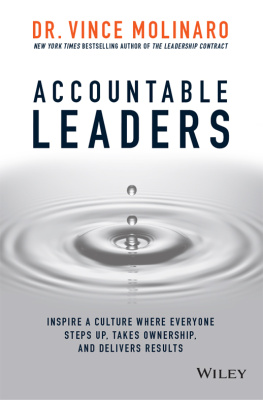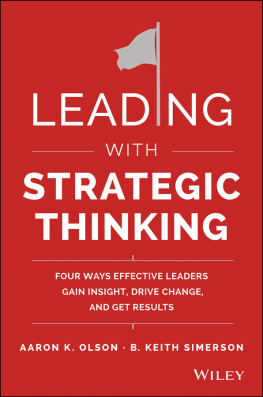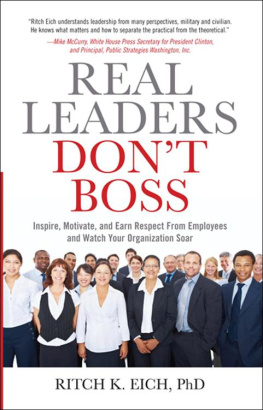

This edition first published in 2018 by Career Press, an imprint of
Red Wheel/Weiser, LLC
With offices at:
65 Parker Street, Suite 7
Newburyport, MA 01950
www.careerpress.com
www.redwheelweiser.com
Copyright 2018 by Fred Halstead
All rights reserved. No part of this publication may be reproduced or transmitted
in any form or by any means, electronic or mechanical, including
photocopying, recording, or by any information storage and retrieval system,
without permission in writing from Red Wheel/Weiser, LLC. Reviewers may
quote brief passages.
ISBN: 978-1-63265-150-1
Library of Congress Cataloging-in-Publication Data
Names: Halstead, Fred, 1943- author.
Title: Leadership skills that inspire incredible results / Fred Halstead.
Description: Newburyport, MA : Career Press, an imprint of Red Wheel/Weiser,
2018. | Includes bibliographical references.
Identifiers: LCCN 2018022921 | ISBN 9781632651501 (pbk. : alk. paper)
Subjects: LCSH: Leadership. | Management.
Classification: LCC HD57.7 .H3454 2018 | DDC 658.4/092--dc23
LC record available at https://lccn.loc.gov/2018022921
Cover design by Kathryn Sky-Peck
Interior by Gina Schenck
Typeset in Minion Pro and Abadi Condensed Light
Printed in Canada
MAR
10 9 8 7 6 5 4 3 2 1
www.redwheelweiser.com/newsletter
Acknowledgments
I'd like to offer special thanks to:
My wife, Donna, for her patience and support, especially over the past few years as this book was ever so slowly written. St. Augustine said: Patience is the companion of wisdom, and she has both. Without her, this book would have remained a dream.
My children and grandchildren, Freddie, Julie, Scott, Amy, Ellie, Ashley, and Allie Cate, whose love and support is unconditional. I have listened to and learned from each of them.
Jeanne Glasser Levine, for her talent as an editor and her willingness to welcome my many changes in the manuscript over the past year.
Michael Pye of Career Press for his keen insights and intuition about how to use my thoughts and cause them to be even more appealing to you, the reader.
Judge Jay Patterson, a friend of fifty years and a talented writer, for his great encouragement and review of a very early manuscript.
Father Greg Methvin for his encouragement.
For my clients who have embraced the concepts and gave me the opportunity to hone them with practical applications. Key among this group are Jon Foster, Sylvia Young, Troy Villarreal, Heather Rohan, Gary Thomas, Mike Sanborn, Biggs Porter, Patti Niles, Kirk Metzner, and Mike Williams.
Kathy Light, who is a trusted, creative, and thoughtful partner in delivering the Skills That Inspire Incredible Results Program to leadership teams.
Contents
Author's Note
Beyond my experience and education, this book is an extension of a program called Skills That Inspire Incredible Results (STIIR) that I offer to leadership teams. As a result, the thoughts, concepts and suggestions have been tested by hundreds of executives. This book is meant to be a catalyst to help each reader become even more successful. It also can be used to help sustain, throughout the STIIR Program participant's career, the effective use of the six key skills.
Introduction
What could be the benefits for you as a person and as a leader if your words and actions come from a foundation of respecting others and a goal of making all those around you successful? Ralph Waldo Emerson said: What we are speaks louder than what we say. Now modify that by one word: Who we are speaks louder than what we say. If you agree with that statement and want to be a person and a leader who thinks the right thing to do is to respect others and help others be successful, this book gives you straightforward, occasionally profound, and consistently practical ways to begin to achieve that, and in the process, achieve incredible results! Let's start with a story of a former client.
The client was a 44-year-old CEO of an organization with about 1,200 employees who had experienced great success during his first twenty years in business. Having been promoted many times, he initially thrived as a CEO, but after five years he found himself in a predicament: Despite having the same position in the same organization, his performance had declined. His boss was clearly not happy with most of the performance indicators, especially as the company faced a fierce new competitor. The CEO knew that to improve the numbers and prevail over threatening competition, it was necessary to develop a new company culture and do so with a heightened sense of discipline and urgencythere was no time to ease into change. In his mind, his job, and maybe even worse, his sense of self-worthhis egowere threatened.
He knew that everyone is responsible for an organization's performance; teams don't succeed unless each person on the team succeeds, but that was not happening. Somehow, every individual throughout the organization needed to develop a greater sense of personal responsibility and accountability. Cultural transformation had to start with the CEO and the way he led and inspired others. To reach their performance goals, he would have to revolutionize his leadership style. It was a bitter pill to swallow. He had to change even though he thought his leadership and intelligence had led to the company's achievements throughout the past five yearsand he thought it would do the same going forward.
Yet, after this tough realization and a growing sense of dread, he was willing and motivated to do whatever he needed in order to get the company back on track. He made the hard decision to change the core of his leadership style, not only because he felt he had to, but also because he knew he wanted to improve as a person and as a leader. The drive to improve became a personal quest. Just three months after his decision, everyone started to see the results: He started to transform himself, and as a result the executive team and the company were all transformed.
Improve the Fundamentals
So, what happened? The CEO sharpened some fundamentals that might on the surface seem deceptively easy to refine. But they are in fact difficult to alter because exceptional focus and discipline are required to change ingrained behaviors and habits. He challenged himself to greatly improve these abilities:
- Listen with purpose, focus, and curiosity.
- Encourage and inspire others through genuinely acknowledging them.
- Ask more on-target and powerful questions.
- Require others to develop their own solutions and action plans.
- Delegate with greater wisdom and thoughtfulness.
- Develop a culture of consistent accountability.
Polishing these skills so that using them fully and consistently became forefront in his mind required focus, discipline, and grit. But once they became habitual, his team began to emulate them. Within just six months, his subordinates started to set new expectations for their own direct reports. One additional thing he discovered was when he was intentional about respecting those with whom he worked, he was more clearly motivated to listen to them, to ask them what they thought, to delegate more effectively, and to hold them accountable rather than doing things himself or just giving them a pass.
Because of his new leadership approach, the CEO found he had more time to think. He was less stressed. His team leaders were finding their own solutions instead of relying on him, and they felt more responsible for the good results. Employee satisfaction and engagement increased. Internal quality indicators were at their highest recorded levels, as were company profits. This dramatic shift took place so quickly simply because the key leader made an important decision to rework the fundamental way in which he led.
Next page












